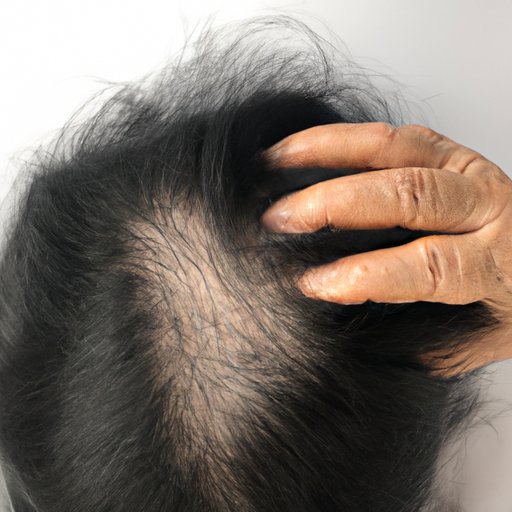
Introduction
Have you ever heard the myth that stress causes white hair? Maybe you’ve even experienced it yourself – you feel like you’ve aged ten years in a day after experiencing a stressful event. Premature hair graying is a phenomenon that has troubled people for centuries, and its causes are still widely debated. In this article, we’ll explore the link between stress and white hair, examine evidence to debunk myths and provide practical ways to prevent, manage or even reverse stress-induced hair graying.
The Science Behind Stress and White Hair: Exploring the Link
To understand the link between stress and white hair, it’s important to first look at the science of hair pigmentation. Hair gets its color from melanin, a pigment produced by the cells at the base of the hair follicle. Melanin production is regulated by enzymes and genes that determine the type and amount of melanin. The more abundant the melanin, the darker the hair; the less melanin, the lighter the hair.
However, over time, melanin production becomes less efficient, leading to the hair follicles producing less melanin, resulting in gray hair. So, you might be wondering, where does stress come into play?
Several scientific studies have linked stress to hair graying. A study published in the Nature journal in 2020 found that chronic stress, which triggers the release of cortisol, leads to hair graying through a process called “oxidative stress.” Oxidative stress is an imbalance of harmful free radicals and antioxidants in the body that can damage cells and tissues.
Is There Truth to the Myth? Examining the Evidence on Stress and White Hair
Stress causing white hair is a common belief, but is there any truth to it? Anecdotal evidence suggests that it’s possible – after all, it’s not uncommon to hear a story about someone who went through a difficult time and suddenly started sprouting gray hairs. There may even be some historical evidence that ties the two together.
However, scientific evidence to support this theory is scarce. One study published in the Journal of Investigative Dermatology found no significant difference in the levels of oxidative stress between people with premature hair graying and those without. So, while there may be some anecdotal and historical evidence to suggest that stress can cause hair graying, the scientific evidence remains inconclusive.
The Emotional Toll of Graying Hair: Discussing Life Changes that Cause Prevalent Stress
Even if the scientific evidence remains inconclusive, anxiety and stress can have a significant impact on hair quality and even cause hair to thin or fall out. The emotional impact of graying hair, particularly premature hair graying, can be devastating for people who experience it. It can cause them to feel like they’re losing their youth and, by extension, their vitality and attractiveness. For this reason, it’s essential to address the root cause of stress to prevent further damage.
Relationship issues, career changes, and financial problems can all take a toll on a person’s mental well-being. These significant life changes may cause stress to build up, leading to hair graying. Preventing stress-induced hair graying involves learning how to manage stress successfully. This can include practicing relaxation techniques like meditation, yoga, and deep breathing. Additionally, it’s essential to maintain a healthy lifestyle by eating healthily, exercising regularly, and sleeping enough.
What Can You Do to Combat Stress-Induced White Hair?
If you’re concerned about stress-induced hair graying, there are several things that you can do to help reverse, prevent, or manage the issue. These measures include practicing stress management techniques and living a healthy lifestyle.
Stress-management techniques, including meditation, mindfulness, and deep breathing exercises, can help reduce cortisol levels, thus minimizing oxidative stress and reducing the risk of hair graying. Managing stress levels can have a profound impact on hair quality and even prevent hair loss.
Eating a balanced diet can also contribute to preventing gray hair. Foods rich in vitamin B12, iron, and other hair-healthy nutrients can help keep hair healthy and vibrant. Additionally, staying away from harsh chemicals and excessive heat styling can prevent hair damage and hair loss.
Stress and Beauty: How Attitudes Towards Age Are Changing
Historically, aging was perceived negatively, with gray hair symbolizing a decline in vitality and attractiveness. However, attitudes towards aging and gray hair are changing as people start to embrace their natural hair color and recognize the beauty and wisdom that come with age.
Medical advancements have also brought about treatments for gray hair, including hair dyes and supplements that can restore or improve hair color. However, it’s important to note that excessive coloring or chemical treatments can damage hair and exacerbate the problem of hair graying.
Instead of trying to hide the effects of aging, embracing one’s natural hair color and expressing oneself confidently is becoming increasingly popular. Gray hair is now considered stylish and trendy, with many celebrities and influencers sporting the look.
Conclusion
In conclusion, while the scientific evidence remains inconclusive about stress causing white hair, there is a clear link between stress and hair quality in general. Managing stress levels is essential in preventing hair damage and promoting overall health and well-being.
Finally, embracing the natural process of aging and taking steps to feel confident and happy can do wonders for one’s self-esteem. Remember, gray hair is just one small piece of the puzzle – it’s the person underneath that truly matters. So, embrace your natural hair color, stay confident, and stay healthy.





